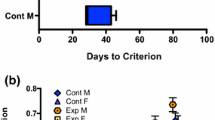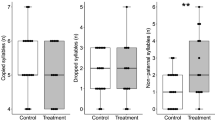Abstract
Developmental stress has recently been shown to have adverse effects upon adult male song structure in birds, which may well act as an honest signal of male quality to discriminating females. However, it still remains to be shown if females can discriminate between the songs of stressed and non-stressed males. Here we use a novel experimental design using an active choice paradigm to investigate preferences in captive female zebra finches (Taeniopygia guttata). Nine females were exposed to ten pairs of songs by previously stressed and non-stressed birds that had learned their song from the same tutor. Song pairs differed significantly in terms of song complexity, with songs of stressed males exhibiting lower numbers of syllables and fewer different syllables in a phrase. Song rate and peak frequency did not differ between stressed and non-stressed males. Females showed a significant preference for non-stressed songs in terms of directed perching activity and time spent on perches. Our results therefore indicate that developmental stress affects not only the structure of male song, but that such structural differences are biologically relevant to female mate choice decisions.




Similar content being viewed by others
References
Andersson M (1994) Sexual selection. Princeton University Press, Princeton, N.J.
Brainard MS, Doupe AJ (2002) What songbirds teach us about learning. Nature 417:351–358
Buchanan KL, Spencer KA, Goldsmith AR, Catchpole CK (2003) Song is an honest signal of past developmental stress in the European starling (Sturnus vulgaris). Proc Rl Soc Lond B 270:1149–1156
Catchpole CK, Slater PJB (1995) Bird song: biological themes and variations. Cambridge University Press, Cambridge, UK
Clayton NC, Prove E (1989) Song discrimination in female Zebra Finches and Bengalese Finches. Anim Behav 38:352–354
Collins SA (1999) Is female preference for male repertoires due to sensory bias? Proc R Soc Lond B 266:2309–2314
Gentner TQ, Hulse SH (2000) Female European starling preference and choice for variation in conspecific male song. Anim Behav 59:443–458
Helekar SA, Marsh S, Viswanath NS, Rosenfield DB (2000) Acoustic pattern variations in the female-directed birdsongs of a colony of laboratory-bred zebra finches. Behav Proc 49:99–110
Kirn JR, Fishman Y, Sasportas K, Alvarez-Buylla A, Nottebohm F (1999) Fate of new neurons in adult canary high vocal center during the first 30 days after their formation. J Compar Neurol 411:487–494
Kittelberger JM, Mooney R (1999) Lesions of an avian forebrain nucleus that disrupt song development alter synaptic connectivity and transmission in the vocal premotor pathway. J Neurosci 19:9385–9398
Nakagawa S (2004) A farewell to Bonferroni: the problems of low statistical power and publication bias. Behav Ecol 15:1044–1045
Nowicki S, Peters S, Podos J (1998) Song learning, early nutrition and sexual selection in songbirds. Am Zool 38:179–190
Nowicki S, Searcy WA, Peters A (2002a) Brain development, song learning and mate choice in birds: a review and experimental test of the “nutritional stress hypothesis”. J Comp Physiol a—Sens Neur Behav Physiol 188:1003–1014
Nowicki S, Searcy WA, Peters S (2002b) Quality of song learning affects female response to male bird song. Proc R Soc Lond B 269:1949–1954
Rice WL (1989) Analysing tables of statistical tests. Evolution 43:223–225
Riebel K (2000) Early exposure leads to repeatable preferences for male song in female zebra finches. Proc R Soc Lond B 267:2553–2558
Riebel K, Slater PJB (1998) Testing female chaffinch song preferences by operant conditioning. Anim Behav 56:1443–1453
Riebel K, Smallegange IM (2003) Does zebra finch (Taeniopygia guttata) preference for the (familiar) father’s song generalize to the songs of unfamiliar brothers? J Comp Psychol 117:61–66
Searcy WA, Marler P (1987) Response of sparrows to deaf and isolation-reared males: further evidence for innate auditory templates. Dev Psycho Biol 20:509–519
Searcy WA, Yasukawa K (1996) Song and female choice. In: Kroodsma DE, Miller EH (eds) Ecology and evolution of acoustic communication in birds. Cornell University Press, New York, pp 454–473
Spencer KA, Buchanan KL, Goldsmith AR, Catchpole CK (2003) Song as an honest indicator of developmental history in the zebra finch (Taeniopygia guttata). Hormon Behav 44:132–139
Spencer KA, Buchanan KL, Goldsmith AR, Catchpole CK (2004) Developmental stress, social rank and song complexity in the European starling (Stumus vulgaris). Biol Lett 271:S121–S123
Vallet E, Kreutzer M (1995) Female canaries are sexually responsive to special song phrases. Anim Behav 49:1603–1610
Vallet E, Beme I, Kreutzer M (1998) Two-note syllables in canary songs elicit high levels of sexual display. Anim Behav 55:291–297
Zahavi A (1975) Mate selection—a selection for a handicap. J Theoret Biol 53:205–214
Acknowledgements
Funding was obtained from the BBSRC (research grant code 7/S14062) and the Royal Commission for the Exhibition of 1851. We thank Sadie Iles-Ryan and Diane Flower for animal husbandry, and Roger Francis for assistance with licensing. All work was conducted under Home Office License no. PPL 30/1777, and therefore conforms to the current laws on animal use in the UK
Author information
Authors and Affiliations
Corresponding author
Additional information
Communicated by W. A. Searcy
Rights and permissions
About this article
Cite this article
Spencer, K.A., Wimpenny, J.H., Buchanan, K.L. et al. Developmental stress affects the attractiveness of male song and female choice in the zebra finch (Taeniopygia guttata). Behav Ecol Sociobiol 58, 423–428 (2005). https://doi.org/10.1007/s00265-005-0927-5
Received:
Revised:
Accepted:
Published:
Issue Date:
DOI: https://doi.org/10.1007/s00265-005-0927-5




